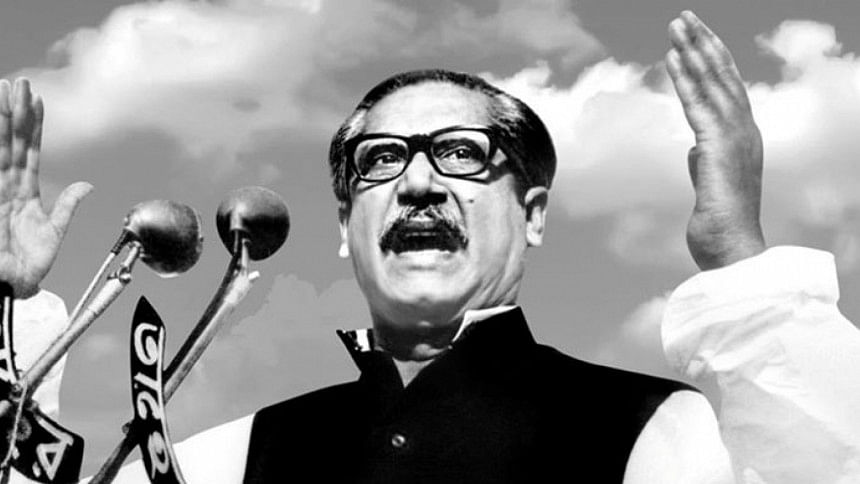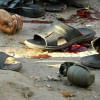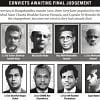August 15, thereafter

We still suffer from the fallout of August 15.
The chaos after the barbaric assassination of Bangabandhu Sheikh Mujibur Rahman and most of his family members 43 years ago changed the course of politics.
A chronology of events after the bloodbath on Dhanmondi Road-32 on August 15, 1975, remains as evidence how the situation became complicated over the years. And consequences of the massacre still haunt the country.
The dawn of August 15 broke with a bluff. The morning radio announcement made by Major Dalim -- the army led by Khandaker Mushtaque Ahmed has taken over power and curfew has been imposed -- was a lie.
The army as an institution was not involved in the bloody changeover. And Mushtaque did not officially assume the office of the president until the afternoon.
The next day, state-run newspapers also published news that martial law was in place. But there was no official gazette notification in this regard until August 20 when president Mushtaque issued a martial law proclamation, giving retrospective effect from August 15.
These show how the killers and conspirators established their control over everything and their words had gained the potency of law.
The violent overthrow of Bangabandhu's government, just three and a half years after the country's independence, was the beginning of a dark episode.
Awami League leader Khandaker Mushtaque Ahmed, who was mired in controversy for his dubious role during the Liberation War, was made president.
He termed the changeover "historic" and "for the sake of the nation" and portrayed the killers of Bangabandhu as the brightest sons of the armed forces and indemnified them by promulgating an ordinance.
The constitution lost its supremacy as the country was under martial law proclaimed by the Mushtaque-led regime. Later, the regime made the constitution subject to its whims and brought many changes issuing proclamations.
There was more anarchy as a battle for power began within the then army leadership resulting in more killings and two more coups on November 3 and 7.
There was no bloodshed in the November 3 coup. But later that night, four national leaders -- Syed Nazrul Islam, Tajuddin Ahmed, M Mansur Ali and Qamaruzzaman, who had led the Mujibnagar government to liberate Bangladesh -- were brutally murdered in prison.
The November-7 counter coup, led by the followers of Jatiya Samajtantrik Dal and Gen Ziaur Rahman, succeeded in their mission. But again, war heroes -- Gen Khaled Mosharraf, Col Najmul Huda and Lt Col ATM Haider -- were brutally murdered.
What Maj Faruk, one of the masterminds of the August 15 massacre, said in his briefing before the attack on Bangabandhu's residence about the objective of the operation -- to form an Islamic government -- came true as their appointed president Mushtaque started working according to the plan.
Pakistan was the first country that recognised the government led by Mushtaque, who dreamt of turning Bangladesh into an Islamic republic, like Pakistan. When Mushtaque was president, he wanted to improve relations with Pakistan.
Mushtaque's successors, Justice Sayem and Gen Zia did not foil the dream of Maj Faruk. During their regimes, the constitution was amended through proclamations to remove secularism from it and insert "absolute trust and faith in Almighty Allah".
The constitutional restrictions on the use of religion in politics was withdrawn allowing some anti-liberation Islamist political parties and organisations, including Jamaat-e-Islami, to resume their activities.
The Gen Zia regime executed a policy of rehabilitation of war criminals. He made Shah Aziz, who opposed Bangladesh's birth, prime minister of his government.
The BNP, the party Gen Zia founded, has been following this policy. Abdur Rahman Biswas, who was against Bangladesh's independence, was made president in 1991. Two more war criminals, Matiur Rahman Nizami and Ali Ahsan Mohammad Mojaheed, chief and secretary general of the Jamaat-e-Islami, were made ministers by Gen Zia's widow Khaleda Zia in 2001.
Assassination of Zia, while in office in 1981, brought in another spell of martial law. Gen Ershad, the then army chief, grabbed state power overthrowing the then president Justice Abdus Sattar in March 1982.
Gen Ershad too continued using religion to consolidate his position. He took it a step further and gave Islam the status of state religion in 1990.
Islamist political parties and organisations mushroomed since the constitutional ban was withdrawn in 1976, allowing their formation and operations.
Between 1964 and 1970, intelligence records claimed existence of 11 Islamist parties involved in various activities. But since 1976, floating of such parties and organisations increased manyfolds.
The use of Islam as a political mobilisation tool did not yield positive results.
Take the example of one militant outfit. Thousands of Bangladeshi youths went off to fight in Palestine, Kashmir, and Afghanistan in the 80's and 90's.
A group of Bangladeshi Mujahideen returnees from Afghanistan in a press conference at the Jatiya Press Club in Dhaka on April 30, 1992, declared the establishment of Harkat-ul Jihad, Bangladesh or Huji-B.
It emerged as a militant outfit and has been accused of being directly involved in the assassination attempt on Sheikh Hasina and carrying out attacks on the country's cultural symbols and sites, including Pahela Baishakh celebrations, monuments and cinema halls.
The escalation of militancy has a root in the use of religion to form political parties and organisations that began after the assassination of Bangabandhu, according to security experts.
Over the years, the situation has become so complicated that the previous Awami League-led government, which brought about major changes in the constitution in 2011, could not bring back the original spirit of secularism despite a Supreme Court verdict in its favour.
The Supreme Court declared illegal and void the fifth amendment through which all activities of the first military regime had been legalised. The verdict paved the way for the restoration of secularism in full spirit. But in the prevailing political situation, the AL-led regime had to compromise.
Now the constitution is in a peculiar state. Secularism has been restored in it but Islam has been made state religion and politics based on religion is allowed.

 For all latest news, follow The Daily Star's Google News channel.
For all latest news, follow The Daily Star's Google News channel. 







Comments